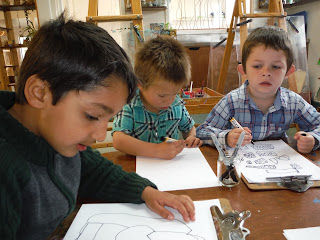Recently
while dancing to the song titled ‘Happy’ by Pharrell Williams it seemed to
spark some thinking amongst our children about what makes them feel happy. I'm talking about that truly happy feeling of being really warm inside your heart, when it
is filled with positive emotions.
It is easy to think that
positive emotions just happen to us as a result of creating or getting what we
want in our lives. But they are not
just the icing on the cake of a great life. Positive emotions can help us create our 'best life'! This is
because they help to open our minds, build up our personal resources and undo
the negative effects of stress. So it is
really worth concentrating on feeling these emotions as much as we can (Hands on Scotland, 2013).
Once the dancing had finished it was really interesting to see how drawing
became the preferred option for the children to express their thoughts and ideas. For most of the children thinking about what
makes them feel really happy seemed to be an easy decision. Yet for others it required a bit more
thinking as they had so many things that made them feel happy, it appeared to be a
difficult decision.
Te Whāriki states that
children need to experience an environment where they develop non-verbal
communication skills for a range of purposes. This Includes children developing non-verbal ways of expressing and
communicating imaginative ideas, and an ability to express their feelings and
emotions in range of appropriate non-verbal ways (Ministry of Education, 1996).
The
focus wasn’t about producing beautiful art work rather getting the children
thinking about what makes them feel happy.
“It isn’t what you have, or who you are, or where you
are, or what you are doing that makes you happy or unhappy. It is what you
think about.” (Dale
Carnegie) The question ‘what makes you
feel really happy?’ provoked great
thinking amongst our children, here are some of their responses:
Mercia: “Ice cream makes me happy my favourite is the
green one. I like flowers too, rainbows
make me happy too.”
Manaia: “That’s me I’m happy, hugs and cuddles make
me happy.”
Kayla: “Playing with my kitty Sammy makes me happy,
it’s all white in the middle and he has black fur and playing with Dora my
lamby.”
Sam: “Lego makes me happy. Aimee and I have hundreds of Lego. I make cars because Aimee and I have wheels
& car buttons, we share the Lego.”
Emma: “My Missy Bear makes me happy, she’s a polar
bear. I like to look after her. She has an upside down triangle nose and she
has a little tiny bow. I got it when I
was I baby. She makes me feel happy
because she’s so beautiful in her purple dress.
Missy bear sleeps in my bed.”
Nyla: “Playing with my lamb. It used to be called Curly but now it’s
called Sandy. When I got him he was
called Curly, so I kept that for a while, but then I changed it to Sandy.”
Ahmad: “I like engines, happy engines. That’s where the air gets in. It’s a great big long pipe there, the smoke
goes out of the van.”
Sadie: “I love playing with my puppy Chester, I like
throwing the ball it’s green with stripes and he chews it.”
Miller: “Having hugs and snuggles with my Mum every
single night. It makes me happy before I
go to sleep.”
Ruby: “Me, Mummy and Daddy go to McDonalds and have
ice cream at the town basin park.”
Sharlotte: “Playing with my magic clip. I like changing the dresses. I’ve got two, Belle and Aurora.”
Pippa: “Playing with my lamb makes me happy. When I lie down she jumps over me.”
Milla: “Mummy and me going for walks to the town
basin. This is Nana and Poppa, I like
going to the town basin with them. I go to the playground. I like the swings. I like going to Nana and Poppa's house.”
“We tend to forget that happiness doesn’t come as a
result of getting something we don’t have, but rather of recognizing and
appreciating what we do have.”
Frederick Keonig
Frederick Keonig
Mā
te wā
Susie























No comments:
Post a Comment